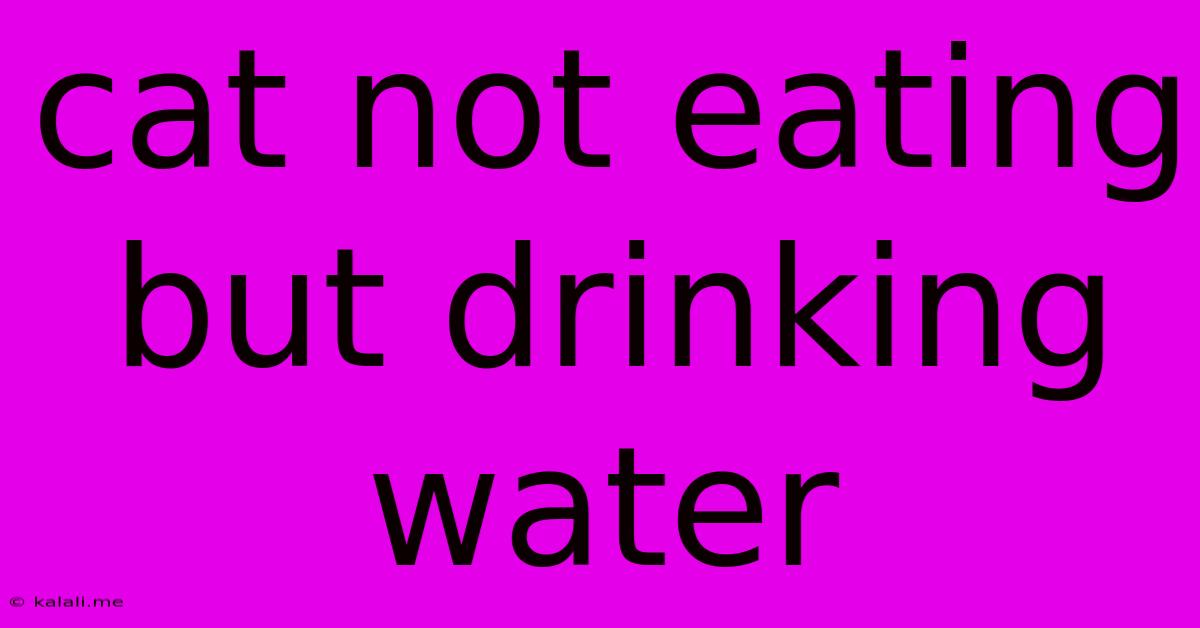Cat Not Eating But Drinking Water
Kalali
May 21, 2025 · 3 min read

Table of Contents
My Cat Won't Eat, But Drinks Water: Understanding and Addressing Anorexia in Cats
A cat refusing food but still drinking water is a serious issue that requires immediate attention. While a decreased appetite can stem from various reasons, ranging from mild stress to severe underlying illness, the continued water intake can indicate dehydration is a concern. This article will explore potential causes, when to seek veterinary help, and steps you can take to encourage your feline friend to eat again. This is crucial for their health and well-being.
Possible Reasons Behind Your Cat's Anorexia
Several factors can contribute to a cat refusing food while maintaining their water intake. Understanding these possibilities is the first step towards finding a solution. Here are some key reasons:
-
Dental Issues: Tooth decay, abscesses, or gum disease can make eating painful, leading to anorexia. Cats are masters at hiding discomfort, so you might not notice obvious signs of dental problems.
-
Gastrointestinal Problems: Conditions like inflammatory bowel disease (IBD), pancreatitis, or gastrointestinal ulcers can cause nausea, vomiting, and loss of appetite. Pain associated with these issues makes eating unbearable.
-
Infections: Upper respiratory infections, urinary tract infections (UTIs), or other infections can sap your cat's energy and diminish their desire to eat. Fever is a common symptom that often accompanies infections.
-
Kidney Disease: Chronic kidney disease (CKD) is a prevalent issue in older cats, and loss of appetite is a common symptom. Increased thirst and urination often accompany kidney problems.
-
Liver Disease: Similar to kidney disease, liver problems can lead to anorexia, weight loss, and changes in drinking habits.
-
Diabetes: Diabetic cats often experience increased thirst and urination (polydipsia and polyuria) along with changes in appetite.
-
Stress and Anxiety: Changes in the household environment, new pets, or even a change in routine can stress a cat and affect their appetite.
-
Certain Medications: Some medications have side effects that include decreased appetite.
-
Cancer: In some cases, anorexia can be a sign of cancer.
-
Hyperthyroidism: This condition can cause an increased appetite, but in some cases, it can lead to loss of appetite.
When to See a Vet: Recognizing Urgent Situations
If your cat exhibits any of the following symptoms alongside anorexia, seek veterinary attention immediately:
- Lethargy or weakness: A significant decrease in energy levels is a critical warning sign.
- Vomiting or diarrhea: These symptoms indicate gastrointestinal distress requiring immediate medical intervention.
- Weight loss: Noticeable weight loss, even a small amount in a short period, demands urgent attention.
- Dehydration: Though your cat is drinking water, dehydration is still possible if the amount consumed doesn't compensate for the loss through illness. Check their gums for dryness.
- Fever: A high temperature is a clear indication of infection.
Encouraging Your Cat to Eat
While veterinary attention is crucial, there are steps you can take at home to encourage your cat to eat. These are supportive measures and should not replace professional veterinary care:
- Offer different foods: Try different types of wet food, including various flavors and textures. Warm the food slightly to enhance the aroma.
- Small, frequent meals: Offer smaller portions more frequently throughout the day.
- Hand-feeding: Sometimes, gentle hand-feeding can be more appealing than leaving food in a bowl.
- Stimulating appetite: Consider a vet-approved appetite stimulant if recommended by your veterinarian.
- Create a calm environment: Reduce stress by providing a quiet, comfortable eating area.
Conclusion:
A cat refusing food while still drinking water is a concerning issue that should not be ignored. While various factors can cause this, prompt veterinary examination is vital for accurate diagnosis and treatment. By understanding potential causes and taking appropriate steps, you can help your feline companion regain their appetite and overall health. Remember, early intervention is key to a positive outcome.
Latest Posts
Latest Posts
-
How To Rotate Map In Google Maps
May 21, 2025
-
How Many Strongholds Are In A Minecraft World
May 21, 2025
-
How Rare Can You Eat Steak
May 21, 2025
-
How Do You Stop A Squeaky Floor
May 21, 2025
-
The Rat From Fantastic Mr Fox
May 21, 2025
Related Post
Thank you for visiting our website which covers about Cat Not Eating But Drinking Water . We hope the information provided has been useful to you. Feel free to contact us if you have any questions or need further assistance. See you next time and don't miss to bookmark.